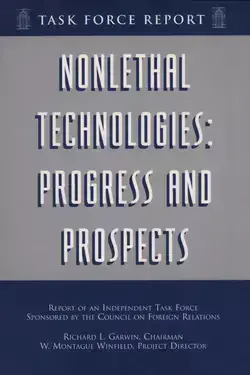TASK FORCE MEMBERS
RICHARD K. BETTS is Director of National Security Studies at the Council on Foreign
Relations and Professor and Director of the Institute of War and Peace Studies at
Columbia University. He has published books on civil-military relations, strategic
surprise, nuclear coercion, and military readiness.
PHILIP A. DUR, USN (Ret.), is Vice President of Tenneco Automotive. He is
responsible for strategy and business development worldwide. He served as a line officer
and political-military planner in the U.S Navy as well as served on the Navy Staff, OSD,
JCS, and the National Security Council staff.
BART FRIEDMAN is a Senior Partner of Cahil Gordon & Reindel. He is a Trustee of
the Brookings Institution, Vice Chair of the Juilliard School and a member of the Visiting
Committee to the Harvard Graduate School of Education.
RICHARD L. GARWIN is Philip D. Reed Senior Fellow for Science and Technology at
the Council on Foreign Relations, as well as IBM Fellow Emeritus in the IBM Research
Division. He is a long-time consultant to the U.S. government on national security
technology and policy and arms control, and a member of several advisory committees in
those fields.
DAVID JONES, USN, is currently Commander, Submarine Squadron ELEVEN in San
Diego, California. He served as a 1998-99 Military Fellow at the Council on Foreign
Relations.
CHARLES R. LARSON, USN (Ret.), is a Senior Fellow at the Center for Naval
Analysis. He served in the Navy for 40 years in a variety of command positions including
service as Commander in Chief U.S. Pacific Command.
EDWARD N. LUTTWAK is Senior Fellow at the Center for Strategic and International
Studies, Washington, D.C. He is also a member of the National Security Study Group
administered by the Department of Defense.
EDWARD C. MEYER, USA (Ret.), is Chair of Mitretek Systems. He was formerly
Chief of Staff of the U.S. Army and a member of the Joint Chiefs of Staff.
CHRISTOPHER MORRIS* is Vice President of M2 Technologies, Inc., support
contractor to the Joint Nonlethal Weapons Directorate. While serving as Research
Director of the U.S. Global Strategy Council, he coauthored the original nonlethal
weapons concept. M2 has been awarded four sole-source U.S. government contracts in
the nonlethal weapons area.
JANET MORRIS* is the President of M2 Technologies, Inc., and has authored more than
40 books exploring the future of technology. She headed the first Nonlethality Policy
Review Group as Project Director and Senior Fellow at the U.S. Global Strategy Council.
ROBERT B. OAKLEY+ is Acting Director for the Institute for National Strategic
Studies at the National Defense University. He served twice as Assistant to the President
for the Near East and South Asia on the National Security Council Staff, and served as
Deputy Assistant Secretary of State for East Asia and as Ambassador to Somalia, Zaire,
and Pakistan.
GEORGE H. QUESTER is a Professor of Government and Politics at the University of
Maryland, where he teaches courses on international relations, U.S. foreign policy, and
international military security. He has served as the Olin Visiting Professor at the U.S.
Naval Academy and taught in the Department of Military Strategy at the National War
College.
FREDERICK ROGGERO, USAF, is the Commander, 22d Air Refueling Wing at
McConnell AFB, Kansas. He served as a 1998-99 Military Fellow at the Council on
Foreign Relations. Prior to the Council, he served as Commander, 319th Operations
Group, 319th Air Refueling Wing, Grand Forks Air Force Base, North Dakota.
HARVEY M. SAPOLSKY is Professor of Public Policy and Organization and Director
of the MIT Security Studies Program.
MALCOLM H. WIENER is a historian specializing in the Aegean Bronze Age,
following prior careers in law and in investment management as Founder and CEO of the
Millburn Corporation. He served as Chair of the 1995 Independent Task Force on
Nonlethal Technologies.
W. MONTAGUE WINFIELD, USA, is currently serving in Sarajevo as the Executive
Officer to the Commander of the Stabilization Force (SFOR). He commanded troops in
Haiti, Macedonia, and Bosnia. He also served as a 1998-99 Military Fellow at the
Council on Foreign Relations.
DOV S. ZAKHEIM is CEO of SPC International Corporation and Adjunct Professor at
Trinity College, Hartford, Connecticut. He is a former Deputy Under Secretary of
Defense for Planning and Resources.
Note: Institutional Affiliations are for identification purposes only.
*Individual largely concurs with the report, but has submitted an Additional View.


 Online Store
Online Store